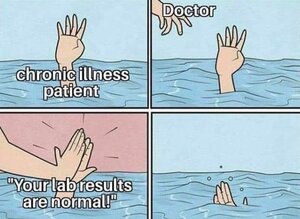- Oct 24, 2017
- 849
- Tinnitus Since
- 10/2017
- Cause of Tinnitus
- one-sided hearing loss (of unknown origin)
Hi there!
We've all been there. You develop tinnitus and it turns your world upside down. Surely, your doctor should be able to help? Apparently not... How about a specialist then, like an ENT or audiologist? Unfortunately, even those often turn out to know next to nothing about tinnitus.
Therefore, we want to create some resources to educate healthcare professionals about tinnitus. We'll start by creating a special Tinnitus Talk Podcast episode; an episode that you can send to your doctor for them to learn more about the condition.
To create the best possible educational resource, we need your input! So please answer this question for us:
What's the number one thing you wished your doctor/ENT/audiologist had understood about tinnitus when you asked for their help?
Let your voices be heard!
We've all been there. You develop tinnitus and it turns your world upside down. Surely, your doctor should be able to help? Apparently not... How about a specialist then, like an ENT or audiologist? Unfortunately, even those often turn out to know next to nothing about tinnitus.
Therefore, we want to create some resources to educate healthcare professionals about tinnitus. We'll start by creating a special Tinnitus Talk Podcast episode; an episode that you can send to your doctor for them to learn more about the condition.
To create the best possible educational resource, we need your input! So please answer this question for us:
What's the number one thing you wished your doctor/ENT/audiologist had understood about tinnitus when you asked for their help?
Let your voices be heard!


 Director
Director Member
Member
